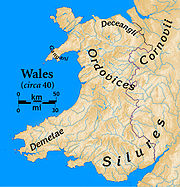
Demetae
Encyclopedia

British Iron Age
The British Iron Age is a conventional name used in the archaeology of Great Britain, referring to the prehistoric and protohistoric phases of the Iron-Age culture of the main island and the smaller islands, typically excluding prehistoric Ireland, and which had an independent Iron Age culture of...
who inhabited modern Pembrokeshire
Pembrokeshire
Pembrokeshire is a county in the south west of Wales. It borders Carmarthenshire to the east and Ceredigion to the north east. The county town is Haverfordwest where Pembrokeshire County Council is headquartered....
and Carmarthenshire
Carmarthenshire
Carmarthenshire is a unitary authority in the south west of Wales and one of thirteen historic counties. It is the 3rd largest in Wales. Its three largest towns are Llanelli, Carmarthen and Ammanford...
in south-west Wales
Wales
Wales is a country that is part of the United Kingdom and the island of Great Britain, bordered by England to its east and the Atlantic Ocean and Irish Sea to its west. It has a population of three million, and a total area of 20,779 km²...
, and gave their name to the county of Dyfed
Dyfed
Dyfed is a preserved county of Wales. It was created on 1 April 1974 under the terms of the Local Government Act 1972, and covered approximately the same geographic extent as the ancient Principality of Deheubarth, although excluding the Gower Peninsula and the area west of the River Tawe...
.
Classical mention
They are mentioned in PtolemyPtolemy
Claudius Ptolemy , was a Roman citizen of Egypt who wrote in Greek. He was a mathematician, astronomer, geographer, astrologer, and poet of a single epigram in the Greek Anthology. He lived in Egypt under Roman rule, and is believed to have been born in the town of Ptolemais Hermiou in the...
's Geographia
Geographia (Ptolemy)
The Geography is Ptolemy's main work besides the Almagest...
, as being west of the Silures
Silures
The Silures were a powerful and warlike tribe of ancient Britain, occupying approximately the counties of Monmouthshire, Breconshire and Glamorganshire of present day South Wales; and possibly Gloucestershire and Herefordshire of present day England...
. He mentions two of their towns, Moridunum
Moridunum (Carmarthen)
Moridunum was a Roman fort and town in the Roman province of Britannia. Today it is known as Carmarthen, located in the Welsh county of Carmarthenshire .-Fort:...
(modern Carmarthen
Carmarthen
Carmarthen is a community in, and the county town of, Carmarthenshire, Wales. It is sited on the River Towy north of its mouth at Carmarthen Bay. In 2001, the population was 14,648....
) and Luentinum
Luentinum
Luentinum was a fort and mining settlement in the Roman province of Britannia. It was associated with the Dolaucothi Gold Mines and its remains lie beneath the adjoining village of Pumsaint in the Welsh county of Carmarthenshire. It lay between similar forts at Llandovery and Bremia near Llanio,...
(identified as the Dolaucothi Gold Mines
Dolaucothi Gold Mines
The Dolaucothi Gold Mines , also known as the Ogofau Gold Mine, are Roman surface and deep mines located in the valley of the River Cothi, near Pumsaint, Carmarthenshire, Wales...
near Pumsaint
Pumsaint
Pumsaint is a village in Carmarthenshire, Wales situated half way between Llanwrda and Lampeter on the A482 in the valley of the River Cothi. It forms part of the extensive estate of Dolaucothi which is owned by the National Trust....
, Carmarthenshire). They are not mentioned in Tacitus
Tacitus
Publius Cornelius Tacitus was a senator and a historian of the Roman Empire. The surviving portions of his two major works—the Annals and the Histories—examine the reigns of the Roman Emperors Tiberius, Claudius, Nero and those who reigned in the Year of the Four Emperors...
' accounts of Roman warfare in Wales, which concentrate on their neighbours the Silures and Ordovices
Ordovices
The Ordovices were one of the Celtic tribes living in Great Britain, before the Roman invasion of Britain. Its tribal lands were located in present day Wales and England between the Silures to the south and the Deceangli to the north-east...
.
Vortiporius
Vortiporius
Vortiporius was a king of Dyfed in the early to mid-6th century. He ruled over an area approximately corresponding to the modern Pembrokeshire. As a mythical king in Geoffrey of Monmouth's treatment of the Matter of Britain, he was the successor of Aurelius Conanus and was succeeded by...
, "tyrant of the Demetae", is one of the kings condemned by Gildas
Gildas
Gildas was a 6th-century British cleric. He is one of the best-documented figures of the Christian church in the British Isles during this period. His renowned learning and literary style earned him the designation Gildas Sapiens...
in his 6th century polemic De Excidio et Conquestu Britanniae
De Excidio et Conquestu Britanniae
De Excidio et Conquestu Britanniae is a work by the 6th-century British cleric Gildas. It is a sermon in three parts condemning the acts of Gildas' contemporaries, both secular and religious, whom he blames for the dire state of affairs in sub-Roman Britain...
. This probably signifies the sub-Roman
Sub-Roman Britain
Sub-Roman Britain is a term derived from an archaeological label for the material culture of Britain in Late Antiquity: the term "Sub-Roman" was invented to describe the potsherds in sites of the 5th century and the 6th century, initially with an implication of decay of locally-made wares from a...
petty kingdom
Petty kingdom
A petty kingdom is one of a number of small kingdoms, described as minor or "petty" by contrast to an empire or unified kingdom that either preceded or succeeded it...
of Dyfed
Kingdom of Dyfed
The Kingdom of Dyfed is one of several Welsh petty kingdoms that emerged in 5th-century post-Roman Britain in south-west Wales, based on the former Irish tribal lands of the Déisi from c 350 until it was subsumed into Deheubarth in 920. In Latin, the country of the Déisi was Demetae, eventually to...
.

